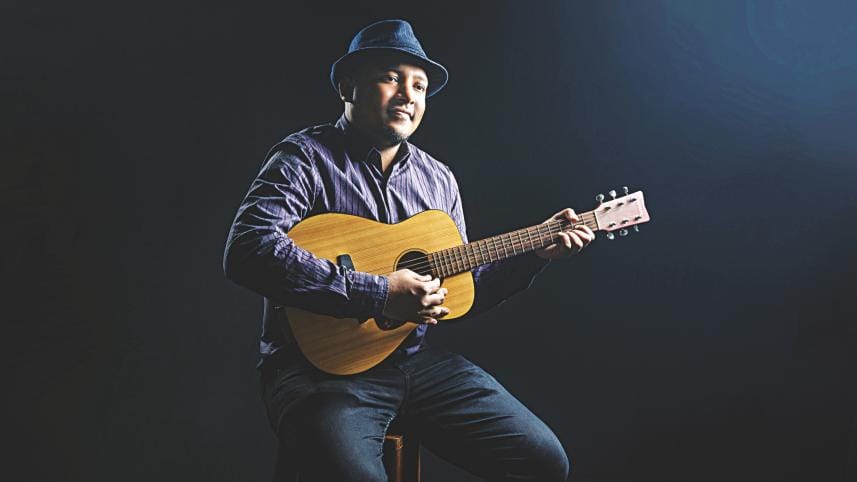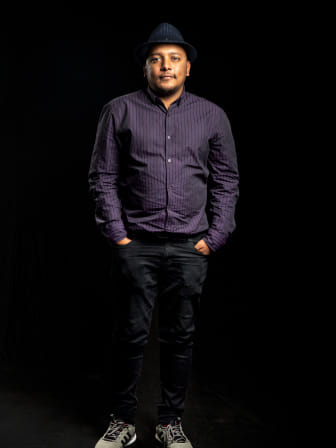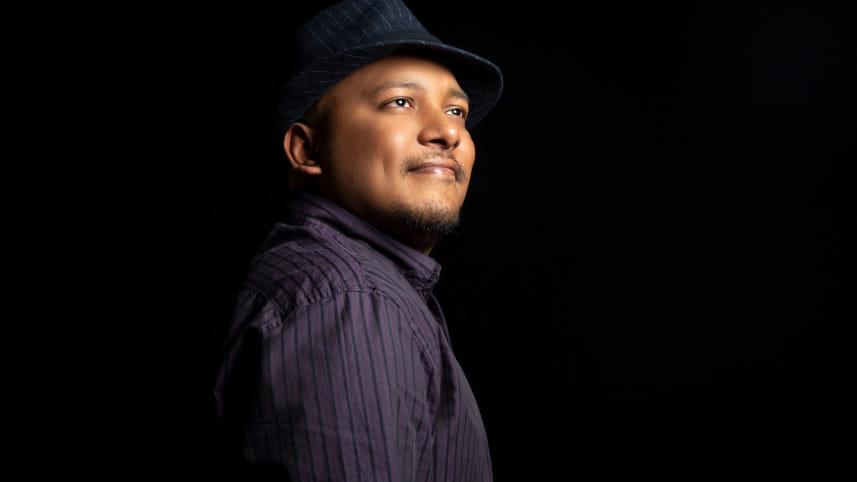THE DANPITE GAANWALA

Rafi Hossain: Minar, for how long have you been involved in the music industry?
Minar Rahman: I released my first album,Danpite, in 2008. From there, my career in music officially commenced.
Rafi: How much have you achieved in your career?
Minar: I feel that I haven't been able to achieve too much;there aremany things which I want to achieve as my career progresses.
Rafi: What do you think is the reason behind your popularity?
Minar: When I was a child,I would search for a new element in the songs I would listen to – be it the sound, composition or lyrical approach. Perhaps, the audience found a new or different element in my songs.Another reason might be the fact that I write and compose my own songs.
Rafi: Are you pursuing music as a full-time profession?
Minar: I am doing music professionally. Apart from that, I draw cartoons from time to time, try to publish a novel every year and write short stories. When I was young, I would read a lot of books. So, I decided to pursue writing. I plan on writing more in the future. Right now, however, I am focused on music as that is what is demanded more. I already have a lot of unreleased tracks, so I will be continuing music for the time-being.

Rafi: Which genre do you think your music falls under?
Minar: I would say that my music is like a fusion of Western and modern Bangladeshi music.
Rafi: What kind of music do you think the new generation is more interested in?
Minar: From what I have seen, majority of the people that listen to my songs are students. Whenever I do concerts, I see many teenagers in the crowd. My music is mainly targeted to people who go to schools or universities. The new generation can listen to any song from any country in the world through YouTube. They might not listen to Bangla songs as their musical tastes are adapting to the sounds of songs from many different countries. Still, there are many who listen to Bangladeshi songs, particularly people from my age-group. A lot of them listen to Rabindra Sangeet with modern musical arrangements added to them.
Rafi: Why do people lean towards the modern musical arrangements, instead of listening to the original?
Minar: Many do listen to the original, but due to the fact that people are more exposed to many different kinds of music now, their musical tastes changed. As a result, they enjoy the modern element in Rabindra Sangeet more than the classical. The modern take only changes the music; the lyrics and tune remains the same.

Rafi: Even though people's music taste changes, some songs do stand the test of time. Why do you think that those songs remain popular, regardless of being released a long time ago?
Minar: There are some songs which conveyed true emotions through their lyrics and tunes, propelling them to become evergreen. Remaking old classics may also help songs to be relevant for years to come by bringing an old loved song back into the limelight.
Rafi: Do you honestly think that your songs or the songs made by artists of your generation will be popular in the future?
Minar: Yes, these songs can definitely stand the test of time. An example of such a song would beShadaRongerSopno from Danpite. Even though that song was released a long time ago, it's popular to this day. When I perform it live, I only have to sing one line; the audience members will sing the rest.
Rafi: How do the songs that you made when you started your career vary from the songs that you make now?
Minar: The musical arrangement is very different now. If I was to remake Shada, it would have a very different musical arrangement than the original.
Rafi: Do you ever feel the urge to remake your songs with new arrangements?
Minar: Yes, definitely. Even when we perform a song live, we use a different musical arrangement. The original arrangements have etched a place in many people's memories, and that's why they may prefer the original. But, if I made a remake of Shada, the next generation might really enjoy it. Songs like Jhoom, which I made recently, have better musical arrangements due to the use of advanced technology which wasn't available back then.
Rafi: Which song of yours helped you become this popular?
Minar: After the release of Ahare,I started gaining popularity. After that, songs like Jhoom and DeyaleDeyale further boosted my popularity.

Rafi: Tell us about your upcoming projects.
Minar: I recently shot the video for a song, Ami TomarKacheJabo, which I plan to release very soon. I plan to release the songs, Bohodur and EktuKhani. Ialso made a song for Dhurba Music Station, but I haven't decided on a name for it yet. All of these are set to be released very soon.
Rafi: Presently, it may happen that if a good song doesn't have a good music video, it may not become popular. The audience puts a lot of importance on music videos now. What is your take on this?
Minar: Music videos became more popular in recent years due to the increase of people using smartphones. I feel that a music video is necessary to promote a song, but if a song is good, it can still gain a lot of views. I don't believe that a good song needs a music video to gain popularity. I only made lyric videos for some songs, but they still gained a lot of popularity. There are many songs which have high budget music videos, but are sub-par on their own. They may become popular for a short time, but they will fade into obscurity soon.
Rafi: Would you like to expand your fan-base to age-groups other than young people?
Minar: I think that people of all ages listen to my music, but majority of the fan-base consists of young people. Some fans even record their children singing my songs and send it to me. There are a few songs that people from all age groups enjoy listening to.
Rafi: While making a song, do you sometimes want to changing the musical style to target a different group of audience?
Minar: When I make a song, everything happens naturally. I am maturing with time, and with maturity, my lyrics and musical style are also changing. The lyrics I write now are of more mature topics as I want to tread into unfamiliar territory. I don't start writing a song thinking about a specific topic; I simply sit in front of the keyboard or piano and it comes naturally to me.
Rafi: Did you learn singing during your childhood?
Minar: I never took singing lessons, but I used to learn to play the keyboard. My family wasn't directly involved with the music industry, but they used to listen to music a lot. My father and uncle also used to sing sometimes in their spare time. Everyone in my family painted. Every award I received during my childhood is for painting.
Rafi: Tell us about your association with cartoons.
Minar: The last time I drew cartoons was in the tribute Unmad did for MAD, a magazine that inspired Unmad.Before that, I did cartoons for Unmad's 40th anniversary issue. Aside from those, I also released a comic-series, Gablu.
Rafi: Are you writing books now?
Minar: I released my first novel, RudraEbongEkti Grand Piano,this year. I also illustrated the cover for it myself. I wrote a short story for Anandadhara'sEid Edition issue. I'm hoping to publish another book next year.
Rafi: Since you work in three different media which require a lot of hard work, do you put equal effort towards all three?
Minar: I don't routinely work with each medium, but when I put my head to something, I give it my complete focus. When I wrote RudraEbongEkti Grand Piano, I didn't work on anything else. For one whole month, I stayed focused and wrote it. I don't like multitasking as it leads to creating projects that I'm not happy with.
Rafi: Are there any other medium you would like to step foot in?
Minar: In the future, I hope to direct a fiction drama or short-film. Before doing that, I need to learn a lot about itand also gather experience. I will be doing music and publisha novel each year, but I'm not sure if I'll add direction to that. I also have a deep love for drawing cartoons, and I think that if I wasn't doing music, I would probably be largely involved with cartoons.
Rafi: Do you have any parting message for the readers?
Minar: People have the ability to access songs from all over the world through their phones, so we're trying to take Bangladeshi songs to a level where people start to listen to them more. I hope all of you will bear with us and keep on listening to Bangla songs.
Transcribed by RidwanIntisaarMahbub



 For all latest news, follow The Daily Star's Google News channel.
For all latest news, follow The Daily Star's Google News channel.
Comments